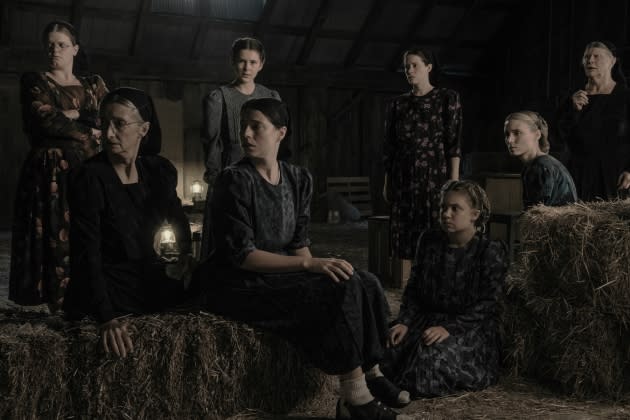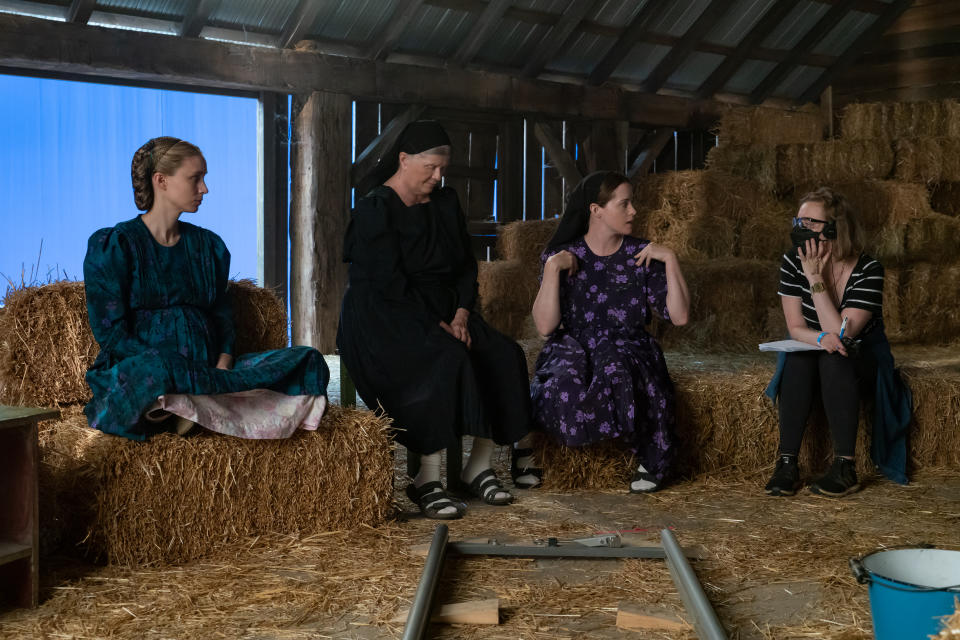‘We Can Imagine a Better Future’: Sarah Polley on ‘Women Talking’
- Oops!Something went wrong.Please try again later.
- Oops!Something went wrong.Please try again later.

“I used to wonder who I would be if this hadn’t happened to me,” the young narrator of Sarah Polley’s Women Talking muses early on. The film quickly abandons that question, though, in favor of a more interesting one: Who will this child, and the other women of this drama, be because of the traumatic events they endured? It is a question Polley, the Oscar-nominated screenwriter, filmmaker and former child star, has given a fair amount of consideration lately.
Earlier this year, Polley published Run Towards The Danger, a collection of essays that explores how she was shaped by her own harrowing experiences: navigating literal minefields on the set of Terry Gilliam’s The Adventures of Baron Von Munchausen as a nine-year-old, enduring an excruciating high-risk pregnancy, and struggling with her own reluctance to join the women who came forward to accuse Canadian radio personality Jian Ghomeshi of assault in 2015. The book’s title comes from advice Polley was given when she was seeking to recover from a traumatic head injury: to confront, head-on at full speed, the same activities that would bring on her worst symptoms.
More from Rolling Stone
Do Nothing, Fight, Leave: Women Take Fate Into Their Own Hands in 'Women Talking' Trailer
'Alias Grace': How a True-Crime Drama Became the Most Relevant Show on TV
And Women Talking — her first film in 10 years, which opened on December 23rd — is a full-speed, head-on confrontation of its own: a work that considers both the many ways a person can react to trauma, and the varying ways a community can collectively choose to respond to it. It’s an adaptation of Canadian author Miriam Toews’ novelabout a group of Mennonite women and children who were being drugged and sexually abused in their sleep. When they woke with unexplained injuries, the victims were sometimes told they’d been visited by demons. It took years before most of the women knew what happened to them, or realized how many others it had happened to as well. (It’s loosely based on the horrifying true story of the Manitoba colony in Bolivia; at least 130 victims, between the ages of 3 and 65, came forward before the trial in 2011. Seven men were eventually convicted.)
The film is not concerned with the crime itself, but with how the women of a pacifist community like that one — who’ve been commanded to forgive their abusers or face exile — will respond. It chronicles the events of a single afternoon when female members of two of the colony’s families convene in a barn, while most of the men have gone into the city to bail out the accused. They have to consider their options: forgive, stay and fight, or leave.
Published in the wake of the #MeToo movement, Toews’ novel was quickly optioned by Frances McDormand and Dede Gardner; the filming of Polley’s adaptation was then delayed by the pandemic. But it is hard not to experience it as a direct response to that cultural reckoning, and an effort to work through questions that, recent events suggest, still remain unsettled.
Polley, at least, has an idea about where to start: “So much of coming to terms with hard things from the past seems to be about believing our own accounts, having our memories confirmed by those who were there and honored by those who weren’t,” she writes in Run Towards The Danger, but those words could easily function as a shorthand description of Women Talking. Polley spoke with Rolling Stone about what she hoped to achieve with the time, her first since returning to directing after a decade away. This interview has been edited for length and clarity.
One of the things, I think, we as a society struggled with at the beginning of #MeToo was the absence of a framework to understand how to acknowledge and respond to abuse once it was identified. Did you think of this film as an effort to create that kind of framework?
I definitely wanted the film to feel like a fable, on which we could map on the specificity of whatever our circumstances in our communities were. I was also cautious because I think it’s really easy to get didactic, and it was really important to stay engaged in the reality of these women in this community and their lives. But inevitably this book did resonate for me because it was asking questions and complicating arguments that were really, really pressing in recent years around gender-based violence and hierarchical systems of power that create inequity.
It’s such a heavy story, one that had the potential to get very dark, but there are moments of levity throughout the film. How did you temper that heaviness as you were writing?
What I was really drawn to in the story is that it’s this incredibly hopeful exercise — this community of women who don’t agree with each other on a lot of things, having to figure out how to work together and move forward together, and the stakes couldn’t be higher. The film at its spine is incredibly optimistic, so I never felt mired in the difficulty of it. It’s about surviving and moving forward together as a community, and a really rich and deep experiment in what democracy might look like. Those, for me, were the driving forces. The trauma is the substance of what they have to deal with as they move through those things. I did think that finding laughter was incredibly important and that we needed a guiding principle of finding moments of release and laughter and levity wherever humanly possible in this film.

Did it take any persuading to get you attached to this project?
I had read the novel, and I saw that Dede Gardner and Frances McDormand had the rights to it, and I sent off an email asking about it. Five minutes earlier, they had sent an email asking if I was available. So it felt very, very meant to be. I was really excited by the challenge of figuring out how to manifest the spirit of the book and in a film, and also of the conversation that might elicit, of the hope it proposed in a time where I just feel like we’re so mired in what’s wrong with the world. And those are important conversations; they’re essential. But I think equally important [questions are]: what do we want to build? And what do we want to move towards?
You’d been away from directing for several years when you emailed them — were you looking for a project to dive back into?
It’s totally due to this film that I’ve come back to directing. I wasn’t looking around for a project to direct, that’s for sure. I just felt this sense of excitement and urgency about this story that made me want to come back. I think that I entered into this project with an enormous amount of gratitude and joy for what the job was, and I felt like I wasn’t taking anything for granted. Just the fact of being able to do this job after being away so long, with my concussion, and feeling like I might never make a film again. I was so grateful for the intensity of the collaboration, the sense of community, and communication. I really do feel like I had at least one moment of euphoria every single day of this shoot. I just was able to come back to it with so much more joy, and so much more of a willingness to take risks.
Moments of euphoria! What would trigger those?
Seeing an actor surprise themself. Seeing you moments where people delivered something that felt so profound and true that the rest of the cast would just kind of leap on them. There would be 15 hands on their back and hugging them. Seeing those moments that were just undeniably great, in terms of performance, and the sense of community that developed amongst these actors, the way they supported each other, moved out of the way for each other, lifted each other up, made space, listened. It just felt … it felt otherworldly sometimes.
The film is based on a novel, not the real life events, but I’m curious — did you speak to any of the survivors from Manitoba?
I did not have contact with actual survivors from Manitoba; I think that would be very hard to do. They’re a pretty cut off, isolated community. But I did have a lot of Mennonite consultants at every stage — people who had grown up in pretty conservative or orthodox colonies, as well as more progressive Mennonites in cities.
The film opens with a preface declaring it “an act of female imagination.”
In one sense it felt empowering, like we can imagine a better future. But it is also depressing because the aspirational better future [has to] be imagined.
In Miriam’s book, she begins by talking about the fact that the elders in the community accused these women of lying, or said that it was ghosts, or Satan, who had raped them. Or that they were trying to cover up adultery. Or that it was an act of wild female imagination. She begins her story and her imagining of these women seeking out and finding their own liberation by saying “What follows is an act of female imagination.” Just taking the term and throwing it back, I thought, was such a powerful act.
How do you reflect on MeToo today? You wrote in your book: “I hope that when this moment of noisy sisterhood dissipates, it doesn’t end with a woman in a courtroom being made to look crazy as these stories often do.” Was that prophetic?
I think that’s happening all the time. I think we see all the time sexual assault cases, where women are made to look crazy, because I think there’s so many fundamental misunderstandings of how the brain and memory works after trauma, and what post assault behavior can look like, in terms of it being counterintuitive of what we might think it would look like. I think there’s a lot of things people can do to kind of normalize or push away an experience that seems at odds with the story of assault, but in fact, is very, very typical. That’s happening all the time. There have been so many conversations, that I think we’re developing a better language around understanding some of those things, and also coming to terms with, and being able to articulate what some of these experiences have been.
On the one hand, there’s a lot of progress. And there’s also now a lot of backlash. It’s really hard to measure. It’s hard to measure where we’re at. But I think the more we can have these conversations and ask the really difficult questions — to be willing to turn over and analyze the more complex things that you know, don’t have a sort of black and white or right and wrong to them — I think the better shape we’ll possibly be in.
Best of Rolling Stone

